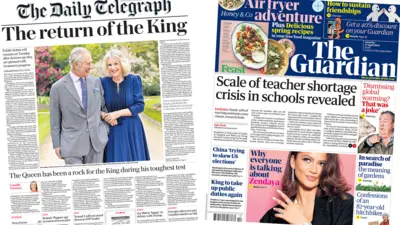We've updated our Privacy and Cookies Policy
We've made some important changes to our Privacy and Cookies Policy and we want you to know what this means for you and your data.
What's gone wrong at Victoria's Secret?
- By Natalie Sherman
- Business reporter, New York
Image source, AFP
The owner of Victoria's Secret has named a new chief executive of the lingerie chain in its latest attempt to revive the company's fortunes.
John Mehas, president of luxury fashion house Tory Burch, will take over in early 2019, replacing Jan Singer.
His appointment comes at a difficult time for Victoria's Secret.
The company is facing declining sales, a rising number of competitors and suggestions that the brand - long a byword for mass-market lingerie in the US - is out of step with fashion.
'Steady decline'
L Brands boss Leslie H Wexner said the new executives would be looking at "everything" as they focused on improving performance.
"I am confident that, under John's leadership, Victoria's Secret Lingerie, the world's leading lingerie brand, will continue to be a powerhouse and will deliver products and experiences that resonate with women around the globe," he said.
Image source, AFP
Still, with Victoria's Secret sales online and at comparable stores sliding another 2% in the most recent quarter, the obituaries being written for the retailer, which started in the 1970s, are unlikely to stop.
This weekend, the New York Times declared Victoria's Secret a name in "steady decline", while the Wall Street Journal said the vision of sexiness defined by the Ohio-based retailer - known for its busty "Angel" models - had "lost its appeal".
Ed Razek, the chief marketing officer of L Brands, also recently provoked intense criticism following comments he made to Vogue magazine about transgender and plus-sized models.
"They definitely need some change in their brand positioning moving forward," said Diana Smith, associate director of retail and apparel at market research firm Mintel.
"I think they're in a little bit of limbo at the moment."
Revenue growth at lingerie stores is expected to rise only 1% annually over the next five years, according to research firm Ibisworld.
That's down from the more than 4% annual rate the industry enjoyed between 2013 and 2018 - and it's a big problem for L Brands, which currently captures more than 60% of revenues and has more than 1,000 Victoria's Secret stores in the US and Canada.
Image source, Reuters
Analysts attribute the slowdown in growth largely to competition from online upstarts, department stores and big retailers such as Gap, which are taking market share.
"Victoria's Secret is still the leader - and the strong leader- in terms of share," said Ms Smith. "It's just that other companies are starting to provide more options and choices to women that weren't there in the past."
Companies such as Lively, ThirdLove or Rihanna's Savage X Fenty, have differentiated themselves by offering a wider range of sizes - including to the growing number of plus-size customers - or focusing on particular products, like no-wire bras.
Lower prices are also part of the appeal, which analysts say is likely to hurt Victoria's Secret's profit margins in the future.
"These small niche operators are only going to continue growing and only going to continue to populate the industry," says Claire O'Connor, lead analyst at Ibisworld. "They have a real shot at competing with Victoria's Secret."
'They'll bounce back'
On Monday, shares in Victoria's Secret's parent company L Brands fell 5% in after-hours trade following its latest results, which showed another decline in sales at the lingerie chain. The share price has fallen more than 40% over the past 12 months.
Victoria's Secret's scale meant it has been slow to respond to some fashions, such as demand for bralettes and triangle bras, categories where sell-outs have increased more than 100% in the last three months, according to analytics firm Edited.
But Ms Smith and others warned that it's too soon to write off the brand.
"Most major companies go through this," said Ms Smith of Mintel. "I think they'll bounce back."
On a recent Friday at a Victoria's Secret store in Brooklyn, New York, a long line snaked through tidy tables stacked with perfumes, pyjamas and lingerie.
Customers Sahara Jackson and Cheriyah Smith, both 17, who were stocking up on lip gloss, praised the brand's quality and offered up blank looks when this reporter mentioned some of the online competitors.
And Shurla Kerr, 35, of New York, was dubious that customers have turned away from the sultry image the brand has championed.
"I think it's the sexiness, that's why people gravitate to Victoria's Secret," she said.
Image source, Getty Images
While Victoria's Secret's comparable sales are down 1% so far this year, that's an improvement over the 11% decline during the same period in 2017 and a less severe drop than some analysts had predicted.
Since April, surveys suggest customer satisfaction has improved and the number of women aged 18-49 making purchases has jumped, according to market research firm YouGov.
More women are also hearing positive things about the company through advertising, media and word of mouth.
Ted Marzilli, chief executive of YouGov's data products division, said he thought the firm's image had taken a hit when the MeToo movement was at its height, but that effect has faded.
"I think reports of its demise were a little premature," he said.
Top Stories
Features & Analysis
Most read
Content is not available








